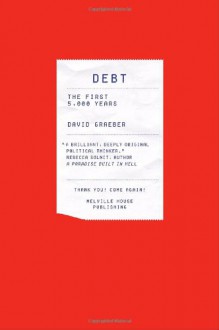
First half 5 stars, second half 3 stars.
When I was in the 5th grade, we had a social studies unit centered around a book called Life On Paradise Island. It was a cartoonish book that told the tale of how a modern economy is developed. It started with the islanders trading coconuts for fish. Of course things got complicated when the coconut guy didn't need or want fish, but he wanted a hut built and the hut builder wanted something else. Eventually a stone currency was developed and it made trading so much easier and lead to thing like inter-island trade, unions, recessions, and even war. The whole thing was supposed to be a microcosm of how an economy works, and I must say that it left an impression on me since I still remember it. The whole premise is that barter leads to the concept of money and once you have money, all sorts of things can happen. Turns out, that premise may not be right.
In Debt, the author debunks the theory that barter begets money. His basic premise is that debt came first. Not being an economist, this seems a bit like a chicken & egg argument. However, the author presents the concept of worth and debt in an anthropological and sociological context which is very compelling. The first half of the book is strong, especially with respect to human relationships and worth. The chapter called Honor and Degradation, or, On the Foundations of Contemporary Civilization goes into the dynamics of human relationships and discusses slavery at length, a topic that I realize I know very little. The chapters after the middle ages were ok, just not as interesting to me. The book was refreshingly free of any capitalism vs. socialism (aka left vs. right) debates, and even argues that parts of our lives are very communistic.

 Log in with Facebook
Log in with Facebook 















